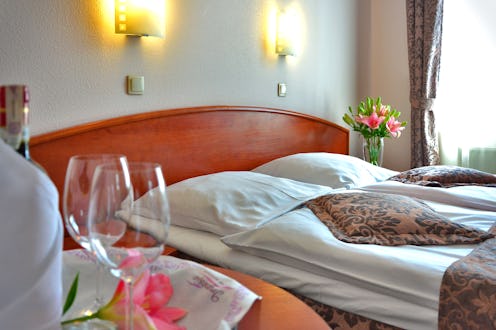
Fellow night owls, rejoice! The science is in, and there may finally be an explanation for why we have such a hard falling asleep and waking up when everybody else does. Apparently, the reason we sleep late goes back to the way our biological clocks are set in our genes. That's right: It's not our fault, it's our bodies' fault. Finally, we can stop apologizing for it, because seriously: We're not lazy. We're just wired that way. And Vox has put together a delightful video that proves it.
While it's true that there are plenty of other reasons a person might miss their alarm, if you're someone who is truly a late sleeper by nature, you can look back on your entire life and see your late-to-bed, late-to-rise habits as an actual trend. You may have tried number of approaches to waking up earlier, but ultimately, chronically sleeping late isn't simply a matter of turning off the TV at a certain a time or buying a new pillow. In fact, you may have a genetic basis for your need to sleep in.
As Vox reporter Brian Resnick and narrator Elizabeth Scheltons explain in their video, a genetic component called a chronotype might be behind chronically late sleeping behavior. Thank goodness, am I right? Here, let's take a closer look at the highlights of the whole phenomenon. Scroll down to watch the full video!
1. How Do Average Sleep Cycles Compare To Late Sleepers?
To figure out when the average person goes to sleep and wakes up, scientists studied when people went to sleep and woke up on days they had obligations (like work or school) and on days they didn't and could sleep in. For most people, the average chronotype means that you'll go to bed around 11 p.m. and wake up around 7 a.m., which puts you at a pretty good place for the schedules of most of society — you can reasonably get to work on time, see your family, enjoy some entertainment, and still get the recommended amount of sleep per night.
A small percentage of the population, however, has very early chronotypes or very late chronotypes. If your chronotype is on the early side, you're likely to go to bed earlier, and while you might miss out on a movie marathon, you can probably still function fairly well. If you go to bed later than others and have to wake up earlier than your body is ready for, however, you may feel chronically groggy and under-rested.
2. Do Scheduled And Free Days Make A Difference For Late Sleepers?
Research shows that if you have an average sleep chronotype, it's unlikely you'll experience a huge difference in sleep pattern and fatigue level on days you have off. That is to say that sure, everyone sleeps in extra late on some weekends, but you're unlikely to dramatically alter your sleep cycle unless you're, for example, traveling overseas. If you have a late chronotype, however, you're likely to experience a bigger jump between your sleep schedule on your days off versus on, because on your days off, you're likely to sleep in late and try to regain the sleep you missed out on during the week. When your obligations pick back up, however, your body has to readjust to less sleep and an uncomfortably early wake time. Ugh.
3. What is the Suprachiasmatic Nucleus And How Does It Impact Our Sleep?
If you have an average sleep cycle, this means the suprachiasmatic nucleus (SCN) likely informs your pineal gland to begin producing melatonin around 9 p.m., which is what begins making you feel sleepy. Around 10:30 p.m., your body begins suppressing your bowel movementsl around 4:30 a.m. your body drops to its lowest body temperature; and around 6:45 a.m., your blood pressure reaches its highest point. Pretty cool, right? This means you're more alert around 10 a.m. (which is probably why offices hold every single meeting at that time on Fridays).
Now, if you have a late chronotype, all of this stuff still happens, but at a later time — and unfortunately, there's not much you can do about it. This biological basis is what can make it so difficult for some people to go to bed and actually fall asleep on time and get enough rest to operate on the same schedule as everybody around them.
In layman's terms, there are "clock genes" within your SCN that turn off and on throughout the day and night and send signals (such as using the bathroom or your temperature dropping) to your body on a set schedule. For the average person, these signals align to most other people's. If you're a chronically late sleeper, however, your entire "clock gene" may be delayed. Makes sense, right?
Check out the full video below to learn more about why some people are late sleepers, courtesy of Vox:
Images: WDnet Studio/Pexels; Vox/YouTube (3)